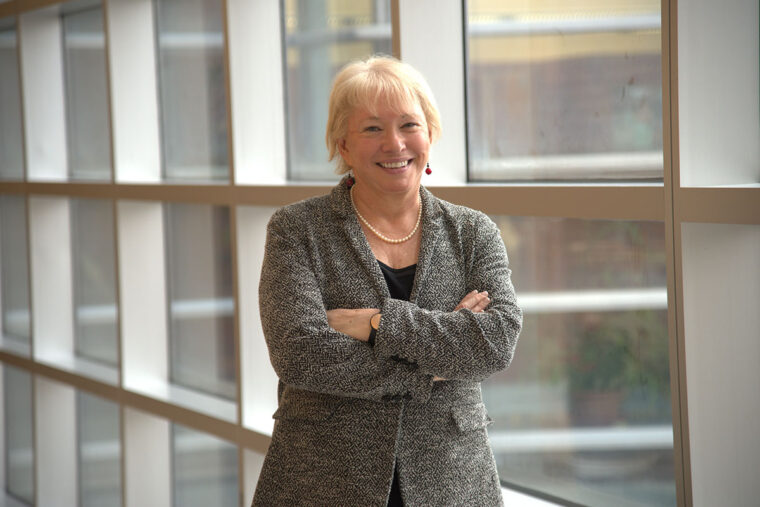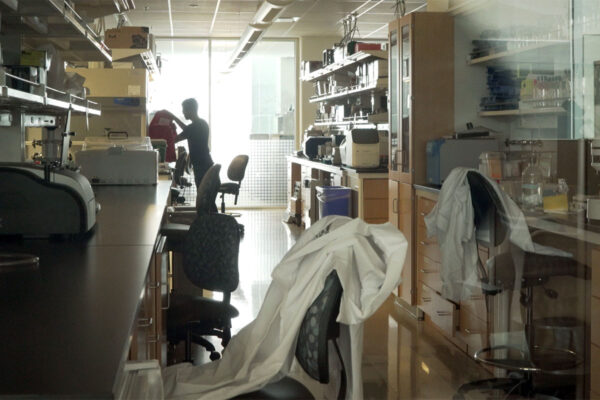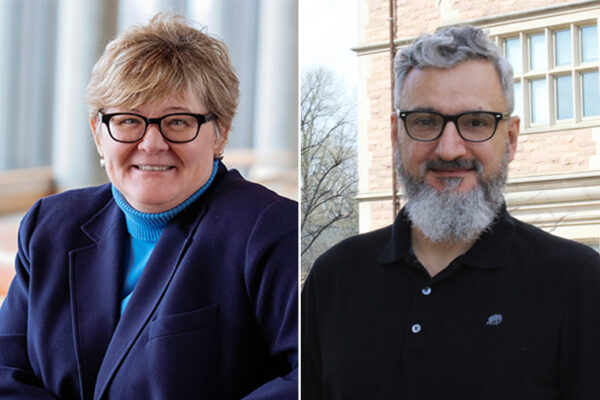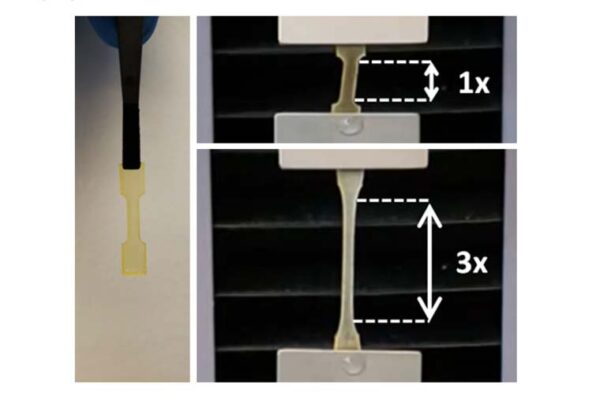Jennifer K. Lodge, vice chancellor for research at Washington University in St. Louis and the David T. Blasingame Professor, will leave the university at the end of the year. Lodge will be joining Duke University as vice president for research and innovation in January.
“Dr. Lodge has served Washington University during extraordinary times, providing outstanding leadership of the university’s research mission before and during the pandemic,” said Chancellor Andrew D. Martin. “Her dedication and experience have helped our faculty guide their research labs through an unprecedented period and through much uncertainty. I’m grateful to Jenny Lodge for her countless contributions to Washington University, which will continue to have a major impact on our institution. I wish her the very best as she embarks on her next chapter.”
Lodge, also the senior associate dean for research at the School of Medicine, has led the massive research infrastructure across Washington University for seven years. Most recently, she has focused considerable effort on navigating the unprecedented circumstances and pressures the COVID-19 pandemic has placed upon the university’s research community.
When Lodge leaves at the end of the year, Mark E. Lowe, MD, PhD, the Harvey R. Colten Professor of Pediatric Science, will serve as the interim vice chancellor for research. He also will serve as the interim associate dean for research at the School of Medicine.
“We are grateful for Dr. Lodge’s leadership and wise navigation of the pandemic, helping to keep the essential research services up and running, and guiding our faculty members in keeping their lab members safe and productive under such difficult circumstances,” said David H. Perlmutter, MD, executive vice chancellor for medical affairs, the George and Carol Bauer Dean of the School of Medicine, and the Spencer T. and Ann W. Olin Distinguished Professor. “Research is essential to what we do at the School of Medicine and across the university, and we are thankful to have had such competent experience at the helm at a time when that was especially important. We were able to necessarily pause and then continue to pursue our vital research mission, most notably key research into COVID-19 itself, in large part because of the tireless work of Dr. Lodge and her team. She has played a key role in planning and execution of the exceptional research expansion of the medical school over the last several years. I wish her continued success in her future endeavors.”
Lodge was appointed vice chancellor in July 2014 and has held a dual role; she also serves as senior associate dean for research at the School of Medicine, where she is also a professor of molecular microbiology. She was named senior associate dean in 2009. Lodge has been the chief officer responsible for the university’s research mission, overseeing more than $600 million in annual sponsored research and managing the development of research policies, grants and contracts, and the continuing education of faculty and staff regarding research regulations.
“We are grateful to Dr. Lodge for her years of service to Washington University and her contributions to the continued excellence of our research labs across the university,” said Beverly Wendland, provost and executive vice chancellor for academic affairs at Washington University. “She has left a legacy of resilience, demonstrating how the university can adjust and then continue in its research mission even in times of tremendous uncertainty. And as we strive to advance academic distinction as a key component of the university’s strategic plan, our ability to collaborate and expand the research enterprise has been a major contribution of Jenny’s — our outstanding Research Development Office is but one of many examples of her leadership and vision. She will be greatly missed.”
Lodge also has coordinated efforts to advance research at the School of Medicine, with a particular focus on interdisciplinary projects involving multiple departments and core facilities that serve a wide variety of researchers. She has assisted faculty in identifying potential funding opportunities and maximizing the benefits of investments in research. In her roles, she also has served as an officer of Washington University and a member of the University Council.
“It’s been an honor to serve the researchers here at Washington University for almost 13 years,” Lodge said. “The quality of research is incredibly high, and the people here are outstanding. I’ve been privileged to work with an incredible team of administrators here, all of whom are dedicated to moving our research mission forward.”
In her own lab, Lodge studies Cryptococcus neoformans, a fungus that causes a lung disease that can spread through the blood to the brain in people. The fungal infection can cause meningitis in patients who are immunocompromised and kills an estimated 180,000 people each year. Her expertise is focused on understanding the fungal cell wall, which is required for the fungus to grow, and how it interacts with the host. Understanding these processes could lead to new antifungal treatments and vaccines.
She is the author of over 75 scientific papers and, since 1997, her work has been funded continuously by the National Institutes of Health (NIH). Lodge is an elected fellow of the American Association for the Advancement of Science, the American Academy of Microbiology and the National Academy of Inventors. In 2014, she graduated from the Executive Leadership in Academic Medicine program at the university, and in 2015, she received the Academy of Science – St. Louis Trustee Award. She has served as chair of the Group on Research at the Association of American Medical Colleges and serves on several editorial boards and NIH review panels.
Lodge earned her bachelor’s degree from Oberlin College in 1979 and her doctorate in biomedical sciences from Washington University in 1988. She continued her postdoctoral training at Washington University and what was then Monsanto. She began her career at Saint Louis University School of Medicine, where she went on to serve as associate dean for research from 2005 to 2009.
Lowe, who will serve as the interim vice chancellor, is a well-known physician-scientist who has played important leadership roles in academic pediatrics throughout his career. He is internationally recognized for groundbreaking work on the molecular basis of dietary fat digestion mediated by pancreatic enzymes, and in the genetic determinants of chronic pancreatitis in children.
“Mark is such a thoughtful scientist with an extraordinary fund of knowledge and collection of experiences in basic and clinical sciences,” Perlmutter said. “He has been funded continuously by NIH and served on many study sections. I know all of that experience will serve us well in continuing to support the full breadth of our research enterprise and infrastructure needs. We have a lot of new space coming on and will need expert administration.”
Lowe is an alumnus of Washington University, earning his bachelor’s degree in biology in 1973. After earning his doctorate in biochemistry at the University of Pennsylvania, he started his scientific career at NIH in 1977, working with several luminaries in the field of cellular physiology. He earned his medical degree from the University of Miami in 1984. Lowe then trained in pediatrics and pediatric gastroenterology at the School of Medicine and St. Louis Children’s Hospital and served on the faculty of the Department of Pediatrics from 1989-2003.
He later became chief of the Division of Gastroenterology, Hepatology and Nutrition, and the Carol Ann Kraumer Endowed Chair for Pediatric Research in the Department of Pediatrics at University of Pittsburgh School of Medicine. In 2017, Lowe returned to Washington University and was named vice chair of clinical affairs and strategic planning in the Department of Pediatrics.
“It is an honor to take on this role, and I thank Dr. Lodge for her extraordinary work leading the university’s research enterprise,” Lowe said. “I look forward to working with talented faculty and staff dedicated to supporting the Washington University research community.”
Washington University School of Medicine’s 1,700 faculty physicians also are the medical staff of Barnes-Jewish and St. Louis Children’s hospitals. The School of Medicine is a leader in medical research, teaching and patient care, consistently ranking among the top medical schools in the nation by U.S. News & World Report. Through its affiliations with Barnes-Jewish and St. Louis Children’s hospitals, the School of Medicine is linked to BJC HealthCare.



